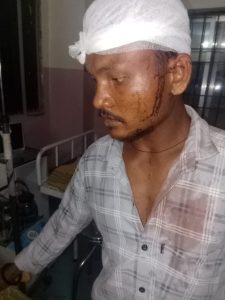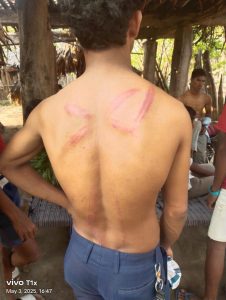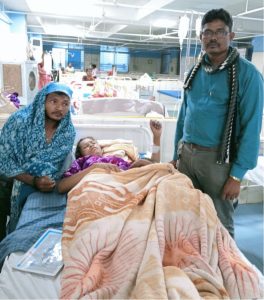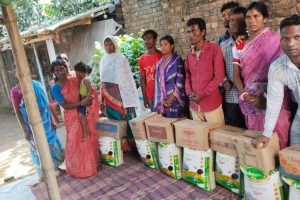 Villagers who practise tribal religion attacked and forcibly expelled ten Christian families from their homes in Chhattisgarh’s Sukma district on April 24. Around 45 Christians, who belong to New Bethesda church, fled Durandarbha village and spent the night in the open air before taking refuge in a church building in Chintalnar, 18 km away, where they remain.
Villagers who practise tribal religion attacked and forcibly expelled ten Christian families from their homes in Chhattisgarh’s Sukma district on April 24. Around 45 Christians, who belong to New Bethesda church, fled Durandarbha village and spent the night in the open air before taking refuge in a church building in Chintalnar, 18 km away, where they remain.
On 28 April two women from the group went back to Durandarbha but they returned terrified, reporting that the villagers had threatened to kill them all if they returned as Christians. Hirma Markam, who was helping to care for the displaced Christians in Chintalnar, said the two women were told, “Leave Jesus Christ and only then enter the village.”
Santosh Markam, also helping to care for the Christians, explained: “The families had to flee towards the hills and some towards the forest with women, children and elderly to escape the fury of the villagers and have not returned to their homes since.”
An expelled Christian named Kunjam Bechem said that one of the families that had been attacked, including three children, stayed in the village. He told Morning Star News, “The Christian and one of his sons were severely assaulted, and the family has been under house arrest since by the villagers.”
Attacked at village meeting
 The attack began when villagers summoned eleven Christian families to a meeting on 24 April. When the Christians arrived around sixty villagers armed with thick wooden sticks surrounded them and demanded that they renounce Christ. The families refused and Kunjam Bechem reported that a Christian woman told the villagers, “We were dying in our sickness, and you did not bother about how we lived. Now that Jesus has healed us and we are living a healthy life, our health and peaceful lives bother you, and you come to question our faith.”
The attack began when villagers summoned eleven Christian families to a meeting on 24 April. When the Christians arrived around sixty villagers armed with thick wooden sticks surrounded them and demanded that they renounce Christ. The families refused and Kunjam Bechem reported that a Christian woman told the villagers, “We were dying in our sickness, and you did not bother about how we lived. Now that Jesus has healed us and we are living a healthy life, our health and peaceful lives bother you, and you come to question our faith.”
The villagers attacked the Christians and raided their homes, seizing and burning Bibles, posters with Bible verses, bank documents, ration cards for monthly government food rations and biometric ID documents. “They showed no mercy to elderly, women and children,” Hirma Markam reported. “The assault was ruthless.”
The Christians fled, chased by their attackers. “We all got scattered – some took shelter in the hills and some in the forest,” Kunjam Bechem said. Next morning they all met at a nearby village and set out for the church in Chintalnar.
 On 25 April the Christians reported the attack and next day police escorted them to a government hospital (the Sukma district hospital, over one hundred kilometres away) for medical examination. Church in Chains partner organisation Persecution Relief reports that while many of the victims were x-rayed no one was admitted or given proper treatment and they are still in pain.
On 25 April the Christians reported the attack and next day police escorted them to a government hospital (the Sukma district hospital, over one hundred kilometres away) for medical examination. Church in Chains partner organisation Persecution Relief reports that while many of the victims were x-rayed no one was admitted or given proper treatment and they are still in pain.
Kunjam Bechem said three children, nine women and six men suffered brutal assaults, and added, “The police advised us not to return to the village immediately but to let the matter settle.”
Police summoned the attackers to the station and cautioned them that repeat offences would result in severe legal consequences, but no arrests were made.
The 45 Christians continue to take refuge in the church building, which is open on all sides, with no walls and no sanitation facilities. When Morning Star News contacted Hirma Markam on 8 May to inquire about their condition he said rain had fallen twice and the church roof of hay and wooden logs was leaking. “It has been so hard for the Christians to stay dry and safe on rainy days all night,” he said.
Kunjam Bechem owns agricultural land in the village and he and his wife Kamla have a five-month-old baby. They have been Christians for three years, while some villagers have been Christians for up to five years. He commented, “The villagers have never had a problem with our faith before.”
Aid delivered
 The displaced Christians fled with nothing, and Persecution Relief responded by delivering food aid on 30 April, followed by practical items on 8 May, including clothes, utensils (buckets, mugs, plates and glasses) and bedding (sheets and mats).
The displaced Christians fled with nothing, and Persecution Relief responded by delivering food aid on 30 April, followed by practical items on 8 May, including clothes, utensils (buckets, mugs, plates and glasses) and bedding (sheets and mats).
Persecution Relief also provided building materials for Mediyam Lakhma, whose house in Durandarbha burnt down on 29 April.
Christians expelled from nearby village
Bhima Sodi, a Christian leader in Sukma district, said the Durandarbha expulsion was not an isolated case and that on 12 April 36 Christians were expelled from Karigundam village, 34 km from Durandarbha. During a village council meeting attended by about two thousand villagers from eight villages, 15 Christian families from Karigundam were pressurised to abandon their faith. Seven families gave into the pressure “for fear of losing their home, livestock and work,” Bhima Sodi said, but eight families refused to renounce their faith, leading to a unanimous decision to expel them from the village.
Two days later the Deputy Superintendent of Police and the Central Reserve Police Force of India visited the village, after social media coverage brought the incident to the authorities’ attention. They confronted village council leaders, warned of legal consequences for future similar actions and ensured the Christians recovered their belongings.
Karigundam, like Durandarbha, is in Sukma district, which has a very low population density and is 65 percent forest. Nearly 85 percent of the population is tribal and the district has India’s lowest literacy rate, at 29 percent.
Growing trend
Persecution Relief reports that in a separate incident in recent weeks over forty more Christians were expelled from their homes in Durandarbha, and comments that this is not just a series of isolated incidents but reflects a growing trend of hostility toward Christians in rural India.
Many villages have only a small number of Christians and without church buildings they gather in homes to pray, sing and study the Bible. For years there was peaceful coexistence but in recent times Christians have been pressurised to return to their former beliefs. They are summoned to public meetings and ordered to deny Christ, and when they refuse they are beaten, their homes are vandalised and they are socially boycotted. They are not allowed to fetch water from public bore wells, local shops refuse to sell them goods and strict fines are imposed on anyone who visits them during family events like weddings or funerals. Christians are denied burial rights, their plants are taken, their homes are destroyed, and fingerprints are taken forcibly to seize their property illegally. Many are chased out of their villages, including children and the elderly.
Persecution Relief states, “Today, hundreds of families sit on barren land, homeless, hopeless, and heartbroken – their only ‘offence’ being their faith in Jesus Christ.”
(Morning Star News, Persecution Relief)
Photos: Persecution Relief (names withheld)
